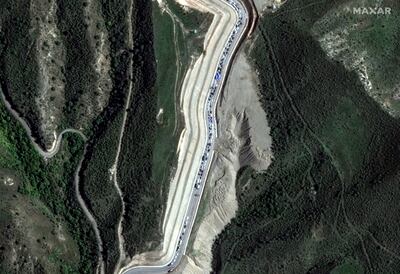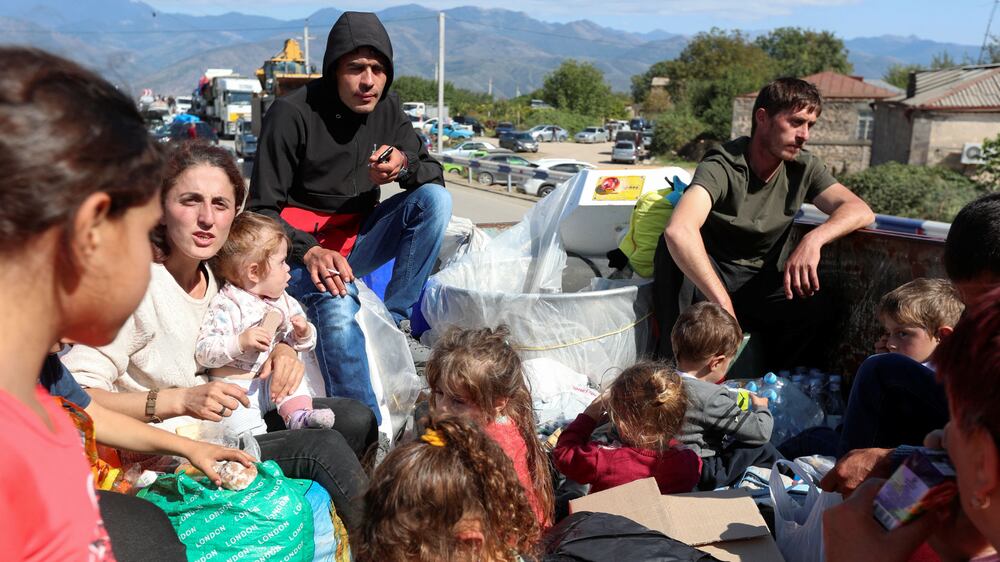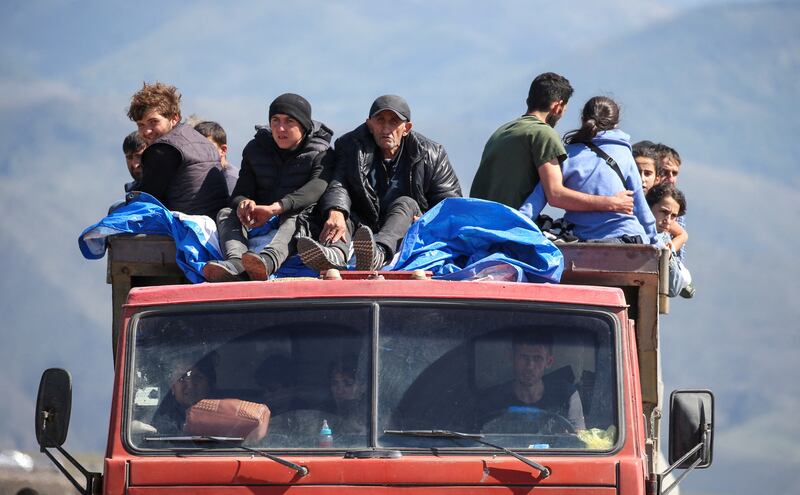Azerbaijan said on Thursday it wanted ethnic Armenians to remain in Nagorno-Karabakh after more than 70,000 living there fled in the days following a lightning military offensive.
The Azerbaijani Foreign Ministry and the country’s ambassador to Britain urged ethnic Armenians to stay on the same day it emerged that the separatist government would cease to exist on January 1.
The announcement followed a decree signed by President Samvel Shakhramanyan, who declared the dissolution of all state institutions by the new year.
“We call on Armenian residents not to leave their homes and become part of Azerbaijan's multi-ethnic society,” the ministry said after more than half of the region's population fled to Armenia over the course of a few days.
Russia, which has sent peacekeepers to the region, earlier noted the dissolution of the ethnic Armenian region.
“We have taken notice of this and are closely monitoring the situation. Our peacekeepers continue to assist people,” Kremlin spokesman Dmitry Peskov said. Moscow was in contact with Azerbaijan on humanitarian-linked issues, he added.
The document refers to an agreement reached last week to end the fighting under which Azerbaijan would allow the “free, voluntary and unhindered movement” of Nagorno-Karabakh residents in exchange for the disarming of troops in Armenia.
Armenia said more than 70,000 of the region's 120,000-strong population had piled their belongings on top of their cars and left by Thursday afternoon, a little more than a week after Azerbaijan launched its latest offensive against the separatist region on September 19.

Meanwhile, the Azerbaijani security service said on Thursday it had launched several criminal cases against Ruben Vardanyan, the former head of government of the breakaway Nagorno-Karabakh region.
Mr Vardanyan, who was arrested on Wednesday, is accused of illegally crossing the Azerbaijani border and financing terrorism. He has been placed in pretrial detention.
On Thursday, the UN called for the rights of Mr Vardanyan to be “fully respected”.
“It is essential that the rights of Ruben Vardanyan and any other detained individuals are afforded full respect and protection,” the UN human rights office said.
That came as Armenian Prime Minister Nikol Pashinyan accused Azerbaijan of carrying out a campaign of “ethnic cleansing” in the region and said all Armenians will have fled the once-disputed separatist region within days.
“The exodus of Armenians from Nagorno-Karabakh continues. Our analysis shows that in the coming days, there will be no Armenians in Nagorno-Karabakh. This is an act of ethnic cleansing of which we were warning the international community for a long time,” Mr Pashinyan told his cabinet.
The region was run by separatist authorities for about 30 years and has been the focus of two wars in the past three decades.
The Nagorno-Karabakh region of Azerbaijan first came under the control of ethnic Armenian forces, backed by the Armenian military, in separatist fighting that ended in 1994.
During a six-week war in 2020, Azerbaijan took back parts of Nagorno-Karabakh along with surrounding territory that Armenian forces had claimed during the earlier conflict.
In December, Azerbaijan imposed a blockade of the only road connecting Nagorno-Karabakh with Armenia, alleging that the Armenian government was using the road for mineral extraction and illicit weapons shipments to the region’s separatist forces.
Armenia claimed the closure denied basic food and fuel supplies to Nagorno-Karabakh.
Azerbaijan rejected the accusation, arguing the region could receive supplies through the Azerbaijani city of Aghdam – a solution long resisted by Nagorno-Karabakh authorities, who called it a strategy for Baku to gain control of the region.
Refugees flee Nagorno-Karabakh after Azerbaijani forces take control

On Thursday, Russia said Armenians fleeing after Azerbaijani forces retook control of Nagorno-Karabakh had nothing to fear, essentially rejecting Armenia's claims of ethnic cleansing in the separatist region.
“There is no direct reason for such actions,” Mr Peskov said, referring to the exodus. “People are nevertheless expressing a desire to leave … those who made such a decision should be provided with normal conditions.”
The exodus began on Sunday evening and the only road linking Nagorno-Karabakh to Armenia quickly filled up with cars that created an hours-long traffic jam.
On Monday night, a fuel reservoir exploded at a petrol station where people seeking to leave were queuing for fuel that, due to the blockade, had been in short supply. At least 68 people were killed and nearly 300 injured, with more than 100 still missing.
Lebanese Armenians scuffle with riot police during protest outside Azerbaijan embassy
Hundreds of Lebanese Armenians scuffled with riot police on Thursday outside the Azerbaijan embassy in northern Beirut during a protest against the Azerbaijani military offensive that recaptured Nagorno-Karabakh from the enclave's separatist Armenian authorities.
Protesters waved flags of Armenia and Nagorno-Karabakh, and burnt posters of Azerbaijan's President Ilham Aliyev and Turkish President Recep Tayyip Erdogan at the rally in the Ein Aar suburb of the Lebanese capital.
Lebanese riot police threw tear-gas canisters at the protesters after they hurled firecrackers toward the embassy building.
Lebanon is embroiled in an unprecedented economic crisis, which has lately restricted the financial support of the Lebanese Armenians for Nagorno-Karabakh because of banks imposing tight withdrawal limits.
Lebanon, a country of about 6 million people, is home to about 150,000 Armenians.
It is one of the largest Armenian expatriate communities in the world.







